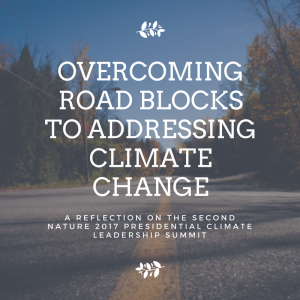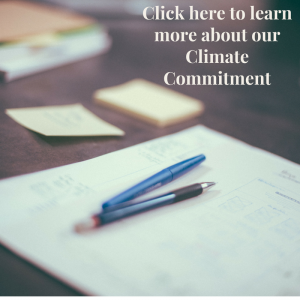
In February, Tina Woolston, the Program Director of the Office of Sustainability, attended the Second Nature 2017 Presidential Climate Leadership Summit to represent Tufts. President Monaco signed the Commitment on Earth Day of April 2016, making the university a charter signatory. I sat down to talk with her about her experience and reflect on how the office and Tufts can incorporate the insights gathered at the conference.
We began our conversation with some of the more novel ideals she gathered from various talks and workshops. These included:
- the data published by NOAA that the sea level will rise six feet by 2100—estimated to impact over 13 million people living near coasts
- the advice that humans should focus on high probability and high consequence events that are happening right now—i.e. extreme climate events—rather than the low probability high consequence events like terrorism
- the fact that the Lancet Commission declared climate change the biggest threat to human health—more severe than Heart Disease, Cancer, Obesity, etc.
It is evident that the world needs to take action and make change now to prevent catastrophic damage to the environment and irrevocable harm to the human species.
Tina heard a recurring theme throughout the conference of the ways democracy and civic engagement are vital to the environmental movement, and how this is an opportunity for universities, including Tufts, “to teach students how to be effective civil agents” as well as for faculty to inform policy as unbiased experts. David Orr, Special Assistant to the President of Oberlin College on Sustainability and the Environment, a speaker at the conference, warned that we are facing a “challenge to the fabric of democracy right now.” He explains that democracy needs to be functional and robust for climate action to succeed, which is very difficult in a time of the fake news and alternative facts that encourage inaction nationwide. The President of George Washington University, Steven Knapp, described the importance of restoring a focus on the state of democracy and civics. Sustainability in higher education concerns the effective connection between environmentalism, social issues, and civic engagement as a mobilizing force.
Tufts has a long history of valuing civic engagement from Fletcher School Alum Peter Ackerman’s International Center for Nonviolent Conflict which teaches about activism through the history of nonviolent protests to the Tisch Scholars’ Foundations class on civic engagement techniques. Tina also mentioned the potential for future workshops and symposiums to find common ground and support networks in the Tufts community that will bridge divides of movements, from human rights, to social justice, to global health, to security, to the environment and climate change, as they are all connected. In fact, the most effective climate messaging discusses impacts to human quality of life, not necessarily sustainability or the environment, which can be seen as only affecting a limited amount of people in another time or place.
Tina also saw a presentation about how Princeton University strengthened its sustainability ethos by creating a 30 year campus plan that is informed by its sustainability plan and its comprehensive utility plan. During the planning process Princeton started each conversation about its priorities with a look at the desired impact the planners wished to have outside of the university environment. This led to planning that incorporated a reduction in environmental footprint, prioritization of environmentally related research to influence policy, and creating university policies to protect and stand up for those impacted by environmental degradation.



Leave a Reply